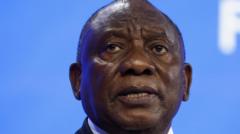U.S. President Donald Trump expressed intentions to halt all future funding to South Africa due to a contentious land reform bill signed by President Cyril Ramaphosa, which enables land seizures without compensation.
Trump's Ultimatum: Funding to South Africa at Risk Over Land Seizure Controversy

Trump's Ultimatum: Funding to South Africa at Risk Over Land Seizure Controversy
Tensions rise as U.S. President threatens to withdraw financial support amid land reform debates in South Africa.
In a recent statement, President Donald Trump announced plans to discontinue all future funding to South Africa, citing concerns over its new land reform law which permits land confiscation without compensation in specified situations. This legislation, signed into law by President Cyril Ramaphosa, aims to address longstanding inequalities stemming from the apartheid era, where a large majority of farmland remains under the ownership of white individuals.
Trump took to social media platform Truth Social, declaring, "I will be cutting off all future funding to South Africa until a full investigation of this situation has been completed!" He further elaborated during a press briefing, asserting that South Africa's government is engaging in "terrible" and "horrible" actions against its citizens. The president asserted that the confiscation of land might lead to even more drastic measures.
The international relations minister of South Africa, Ronald Lamola, responded to Trump's comments, expressing a desire for a deeper examination of South African policies by American advisers, framing the country as a constitutional democracy committed to justice. He emphasized that the new law does not enable arbitrary land seizing and that dialogue with property owners remains a priority.
In 2023, the U.S. allocated approximately $440 million in aid to South Africa, underscoring the importance of this financial relationship. According to President Ramaphosa's administration, the existing "willing seller, willing buyer" policy has hindered effective land reform execution, protecting the interests of previous landowners. Critics, however, warn that the new law bears resemblance to Zimbabwe's historical land reform failures, which led to economic decline and investor retreat.
As this situation unfolds, attention will remain fixed on the implications of Trump's threat to South Africa and the broader context of land reform on the continent.
Trump took to social media platform Truth Social, declaring, "I will be cutting off all future funding to South Africa until a full investigation of this situation has been completed!" He further elaborated during a press briefing, asserting that South Africa's government is engaging in "terrible" and "horrible" actions against its citizens. The president asserted that the confiscation of land might lead to even more drastic measures.
The international relations minister of South Africa, Ronald Lamola, responded to Trump's comments, expressing a desire for a deeper examination of South African policies by American advisers, framing the country as a constitutional democracy committed to justice. He emphasized that the new law does not enable arbitrary land seizing and that dialogue with property owners remains a priority.
In 2023, the U.S. allocated approximately $440 million in aid to South Africa, underscoring the importance of this financial relationship. According to President Ramaphosa's administration, the existing "willing seller, willing buyer" policy has hindered effective land reform execution, protecting the interests of previous landowners. Critics, however, warn that the new law bears resemblance to Zimbabwe's historical land reform failures, which led to economic decline and investor retreat.
As this situation unfolds, attention will remain fixed on the implications of Trump's threat to South Africa and the broader context of land reform on the continent.






















